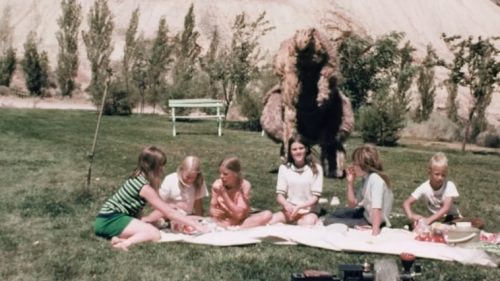Everybody’s Into Weirdness: LADIES AND GENTLEMEN…THE FABULOUS STAINS (1982)
The Alamo Drafthouse is a brand built on weird. Beyond being situated in a town that has long aspired to remain eccentric in the face of all normality, it’s easy to forget that the original Alamo started as something of a private screening club, running prints of the odd and obscure into all hours of the night. Though the company has obviously grown into an internationally recognized chain of first run movie palaces, the Drafthouse Ritz in Austin, Texas remains committed to showcasing genre repertory programming, namely via its Terror Tuesday and Weird Wednesday showcases. This column is a concentrated effort to keep that spirit of strangeness alive, as programmers Joe A. Ziemba and Laird Jimenez (often pulling from the extensive AGFA archives) are truly doing Satan’s bidding by bringing ATX weekly doses of delightful trash art.
The sixteenth entry into this disreputable canon is the cinematic precursor to riot grrrl punk: Ladies and Gentlemen…The Fabulous Stains…
Year: 1982
Trailers: Thunder Alley; Times Square
The beginnings of the riot grrrl punk movement arrived roughly a decade after Lou Adler’s Ladies and Gentlemen…the Fabulous Stains was dumped and roundly ignored in theaters. Artists like Kathleen Hanna and Bikini Kill were fed up with a male-dominated scene, and forged their own path via a DIY mentality, utilizing ‘zines, political activism, and plain ol’ shredding in underground venues to help further their cause. Their music was a sonic announcement that women were no longer going to be denied a voice in punk and hardcore any longer.
Yet The Stains were rebel girl avatars a full ten years before Olympia, Washington, became a launching pad for feminist mosh pits. Screenwriter Nancy Dowd has stated that the inspiration for Corrine “Third Degree” Burns (Diane Lane) and her scrappy lo-fi orchestra was the Ramones, but the Stains feel more like a fictional big screen extension of bands like Bush Tetras and The Runaways – empowering post-punk and riff-heavy New Wave. From the stage to living rooms everywhere, the trio of teenage fugitives become idols for an entire generation of young women who just want to escape the dreadful gender norms imposed upon them by American culture. The Stains’ discord is dissonance that yelps, “we don’t put out…and neither should you.”
Adler and Dowd go out of their way to align our perception of The Stains with the status quo from the picture’s earliest scenes. When we first meet Corrine, it’s via a TV broadcast, as a news team is checking in on the “darling” America fell in love with after witnessing the girl lose her shitty job live on the air. Corrine is immediately objectified by the camera – not so much a person as she is a plastic pixie, whose economic and social strife are mere amusing drama for journalists focusing on an attractive exterior. Stark cinematography by Bruce Surtees (The Outlaw Josey Wales, Beverly Hills Cop) captures the Pennsylvania steel town she reluctantly calls home in all of its smoggy glory. A reporter is baffled when Corrine lights a cigarette, as her mother just expired from cancer. “You call it cancer, I call it breathing,” Corrine replies, clueing us in on how attuned she is to the cruelties of a dead end existence. Smoking didn’t kill her mom; being stuck in this shithole did. The news team may only see a sweetheart, but what’s really being offered up is a ball of raging teenage discontent.
The emphasis on Corrine’s social status sells the brand of sovereignty that jumping on a bus to follow a dream offers not just her, but her band mates – lil’ sis, Tracy (Marin Kanter), and blonde beanpole best bud, Jess (Laura Dern). After witnessing The Looters belt out “The Professionals” – a speedy, aggro three-chord anthem – at their local wood-paneled rec hall, Corrine knows that this music will pick her and her friends up and take them anywhere but here. For anyone who has ever found themselves three feet from a pit, caught amongst a gaggle of kids charged by the pure vigor of punk rock, this early performance will be a moment of unrestrained cinematic truth. Adler and Dowd understand the youthful electric current punk carries, and transfer it to celluloid via shot in the arm filmic alchemy. Watching a baby-faced Ray Winstone (in his first American film role) howl, scowl and pout on stage while flanked by Paul Simonon of The Clash and Steve Jones/Paul Cook of The Sex Pistols is a thrilling, raw movie musical moment.
“Everybody wanna go to Heaven, but nobody wanna die,” says Lawnboy (Barry Ford), the multi-hyphenate roadie/promoter/bus driver/peacekeeper ensuring the seemingly final tour of washed up glam rock has-beens, The Metal Corpses, chugs along. The Looters and Stains are only opening acts for this collection of haggard, face-painted old men, all looking to score cheap coke so that they can power through their next middle of nowhere gig. Having The Stains hitch their wagon to this rusty, busted trailer of a band is something of a genius stroke, as it instantaneously gives you a glimpse at the burgeoning want for fame, as well as the inevitable end of the line rock gods face.
Where The Looters and The Stains are constantly fighting to keep themselves on the bill, The Metal Corpses are struggling to stay relevant in a music scene that really has no more patience for their brand of pompous guitar hero antics. It’d be sad if Fee Waybill (of The Tubes) didn’t inject front man Lou Corpse with such an insufferable propensity for never shutting the fuck up about how great he is (a mouth, no doubt, fueled by all the blow reportedly being ingested on set). He’s the perfect fictional representation of an out of touch former heavyweight – all talk and hooded eyes, his glory days well behind him. He’s a jackass with a killer axe, waiting to be taken behind the next flophouse they play and popped in the head; a mercy kill for this diminished titan.
Lawnboy’s words also announce the harsh realities of being in a touring band Ladies and Gentlemen…The Fabulous Stains effortlessly captures. To those on the outside, punk might seem like nothing more than spitting, sneering and riffing on stage. But the truth is: most bands’ time is spent on a bus, roaming from one city to the next, until the boroughs all blur into a faceless American mass. The “dream” takes work and determination. For The Metal Corpses, oxidation is finally starting to show on the machine, as the band has spent entirely too much time playing the same set ad nauseam. Reality grinds talent down to dust, as the path to stardom is paved with the coke-dusted bodies of those who came before. It helps that Adler was a twenty-plus year veteran of the music industry, having managed and produced for Sam Cooke, The Mamas & the Papas and Cheech and Chong (whose Up in Smoke was his directorial debut). Adler’s time in the trenches is felt during these road scenes, adding an air of undeniable authenticity.
Corrine and The Stains’ message is informed by how the audience, including those of us in the theater, views them. At an early gig, the girls take the stage and play the off-key jangle, “Waste of Time”, during which Corrine dons phoenix eye makeup, a heavy coat and red beret. The crowd – all of whom seem to be entertaining the performance as background noise for their respective conversations – aren’t so much horrified by the abrasive, blown out, screed as they don’t entirely know what to make of it. Embarrassed, Tracy and Jess toss their instruments, cutting the song short and leaving Corrine all alone. Instead of fleeing with her band mates, the front woman grabs the mic, pulls her hat off (revealing a crop of two-tone bleached hair) and verbally accosts the onlookers, warning the women that the men by their side see no place for them in the future. When a patron tosses his drink at her, the crowd applauds and Corrine drops the coat – only a see through cherry blouse and nylons underneath, further antagonizing her attacker.
It’s a wild, provocative moment, especially once you remember that this is a fifteen-year-old girl glaring down at these people. However, it also feels incredibly genuine and alive: an embracement of what punk rock meant to artists who championed it as a form of pure rebellion. You could disseminate any message you wanted from the stage, and Corrine becomes something of a revolutionary, asking women to question their place in the world. The Stains’ music is a weapon for the singer, as she swipes the Looters’ rocket of a lead single and repurposes it; a ballsy middle finger that dares these men to reclaim what she now deems hers. The media don’t know how to cover these young women, and that inspires a legion of “skunks” to model themselves after Corrine, whose mercurial popularity inevitably leads to selling out. It’s the lifecycle of a shooting star, packaged into ninety minutes, as Diane Lane proves herself a rebel girl deity*.
This is the real power of Adler’s movie: it harnesses such a valid dynamism that it’s difficult to deny, even at its rudest peaks. Rebellion and empowerment aren’t cutesy; that shit’s for suckers. Corrine is one ferociously angry youth, tired of never getting a say because of how society perceives her gender. Sadly, Dowd would remove her name from the film after being groped on set by a cameraman and having her original ending altered to a tonally jarring MTV finale that feels completely out of step with the rest of the picture (no matter how catchy the credits sequence may be). Paramount then buried the film after poor test screenings, dumping it in art houses around the country before refusing to release it on video for decades.
Ladies and Gentlemen…The Fabulous Stains would find a second life on cable and eventually DVD, but the damage had already been done. Life reflected the fears of the Stains’ original creator, to the point of suppressing their voices for years. The cult following the movie slowly acquired is not enough. We should all be proud enough to call ourselves “skunks,” because Third Degree Burns was the first in a musical (and cultural) revolution still being fought. Corrine and her cohorts refused to be “just another girl, lining up to die.” Her voice echoed on (however inadvertently) for years to come in the circles of underground punk. Now it needs to be taken to the mainstream. Join the professionals today.
Tonight on Weird Wednesday: John Carpenter’s Assault on Precinct 13
Previous WW Features: Penitentiary; Skatetown USA; Blood Games; The Last Match; Invasion of the Bee Girls; Julie Darling; Shanty Tramp; Coffy; Lady Terminator; Day of the Dead; The Kentucky Fried Movie; Gone With the Pope; Fright Night; Aliens; Future-Kill
*Leading to the ultimate Diane Lane rock goddess role as Ellen Aim in Walter Hill’s neon masterwork, Streets of Fire.



